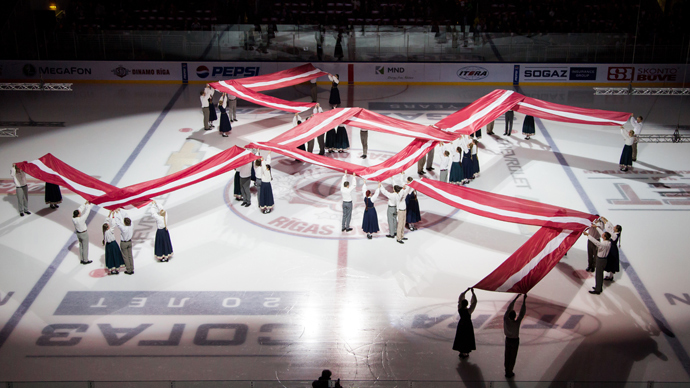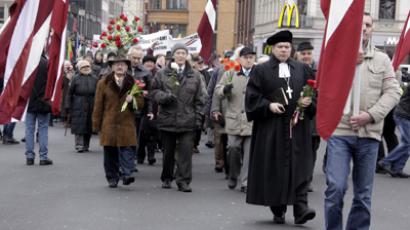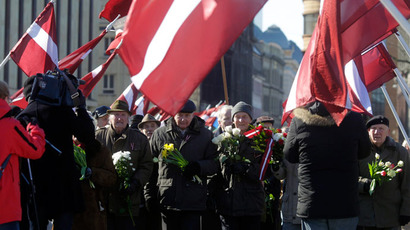Swastika on ice? Latvian solar symbol stunt causes outrage in Russia

Russian hockey fans and anti-Nazi groups were outraged after dancers supporting a Latvian hockey club laid out a symbol resembling swastika right before a game with their Russian guests. The Kontinental Hockey League found no problem with the symbol.
The idea of the ice show ahead of Sunday’s match between Russian
HC Yugra and the Latvian hosts, Dinamo Riga, was to mark the 95th
anniversary of the Republic of Latvia. A part of the show
featured dancers forming a number of national and folk symbols
with the help of the Latvian flags.
One of those formations was, however, taken as an insult and a
provocation by fans of the Russian club, and later by many other
Russians, after a photo of what appeared to be a huge swastika
laid out on the stadium’s ice went viral in the media on
Wednesday.
The performance, which was carried out by two dance groups of
Latvia’s National Armed Forces and was staged by a Latvian
choreographer, has since become the subject of a public
controversy.
World Without Nazism movement has protested the stunt and sent
letters condemning the “swastika show” to the Kontinental Hockey
League (KHL).
The group’s president Boris Spiegel said he was “astonished” by
the incident, and that the sport’s organization should react to
this “cynical act.”
The Latvian side said they were “surprised” and
“disappointed” by such a reaction to what they claimed was
merely a demonstration of an ancient folk ornament.
However, according to Spiegel, it is “apparent” that the
ancient symbol has forever been tainted by the association with
Nazi Germany and any attempts to advocate its ideology and
represent its symbolism should be taken as a direct insult to the
millions of victims of the World War II.
This is not the first instance of tension between Latvian and
Russian officials, revolving around incidents that World Without
Nazism has defined as “glorification of German National
Socialism and its collaborators with full support of the local
authorities.” This involved the controversial demolition of
memorials for Soviet troops that liberated Latvia from the Nazis
in 1944. In Russia, brandishing a Nazi symbol in public is
punishable by law.
Despite the emotional response and the mounting pressure, the KHL
said it has found no grounds for calling the figure a Nazi
swastika after looking into the incident.
The ice hockey league said in an official statement on Friday it
has carefully studied the Latvian performance, even inviting a
specialist in heraldry as part of the investigation. The probe
has found that the controversial ornament was in fact an ancient
Latvian solar symbol, known as “Saules zime,” and that it
“has nothing to do” with Nazi ideology.
Instead, the figure wishes good fortune or a blessing, the KHL
said. The Latvian club should probably refrain from using such a
potentially misunderstood symbol at an international event, it
added. The club itself said it regretted insulting the feelings
of the hockey fans.
Curiously, the symbol might really have bestowed good luck on the
Latvian team, as Dinamo-Riga beat their Russian guests in
overtime.














